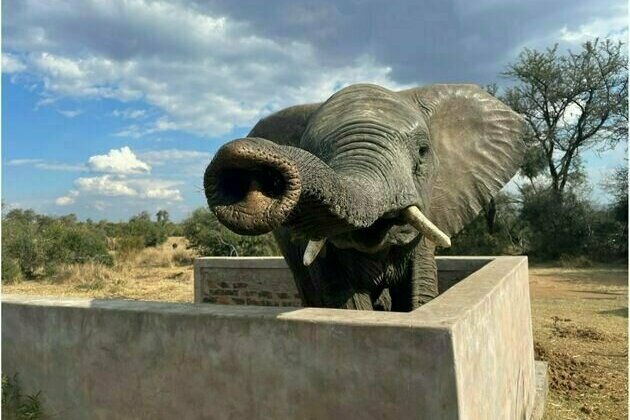How do you stop elephant herds from trashing crops and trees? Target sensitive nostrils with a 'scent fence'
The Conversation
09 Oct 2024, 03:12 GMT+10

Elephant numbers are surging in southern Africa, with fewer natural predators, reduced hunting pressure and feeding by farmers and tourist operators.
While this is good for elephants, it's making life harder for humans who live near them. These huge herbivores can raid crops and destroy large trees in national parks with impunity, causing problems for farmers and land managers alike.
Traditional solutions aren't ideal. Culling is controversial, and building fences strong enough to deter elephants is very expensive.
But there's another option: a fence made of scent. We have explored how specific plant scents can stop wallabies from eating native seedlings. The technique works on Australian herbivores. Would it work for southern Africa's much larger elephants?
Our new research put this idea to the test. We mimicked the scent of a shrub known as common guarri (Euclea undulata), which elephants avoid eating, and built a Y-shaped maze for elephants. We placed the scent on one side of the Y and left the other side scent-free.
The results were clear - our elephants voted with their trunks and avoided the stinky side. This suggests scent could play a useful role in fending off hungry pachyderms.
The world has three species of elephant. The small Asian elephant is endangered while the even smaller African forest elephant, which lives in rainforests in West Africa and the Congo Basin, is critically endangered.
But the largest species, the African savannah elephant, is bouncing back in southern Africa from decades of poaching and habitat loss.
This is great on a conservation front. But it brings fresh problems. As elephant herds expand, they increasingly come into conflict with people - especially farmers. Losing a year's crop to hungry elephants is devastating. When farmers try to stop them, the elephants can attack and even kill.
In large numbers, elephants can damage the natural environment like other herbivores - but even more so. In South Africa's Kruger National Park and other wild places, their enormous appetites have reshaped whole plant communities. The plants elephants like disappear, while those they don't spread. Elephants also destroy large trees and prevent the growth of new ones.
As elephant numbers grow, desperate farmers and land managers have scrambled for solutions. Killing problem elephants has been a common fix. But the practice now faces strong public opposition. Fencing is costly and usually impractical for lower-income farming areas. Other deterrents, such as using flashing lights and annoying sounds to scare off the pachyderms have had mixed success.
Curiously, elephants are scared stiff of bees. This knowledge has been used effectively by Kenyan farmers, who install beehives around their fields. Studies have shown the technique deters up to 80% of elephants. This method has limits, though, as there are only so many bees an area can sustain and maintaining hives takes work.
To deter an elephant, it helps to think like an elephant. We've long known carnivores rely heavily on scent to find prey. But scent is very important to herbivores too, as our team has explored. Herbivores rely on smell to tell them which plants to eat and which to avoid.
In Australia, we have used this knowledge to artificially replicate the scent of boronia pinnata, a flowering shrub which swamp wallabies avoid. These wallabies are the local native equivalent of deer in their eating habits - they eat many different plants, including tree seedlings land managers would rather they did not.
When we put vials of boronia scent next to vulnerable native seedlings in Sydney's Ku-ring-gai Chase National Park, we found these seedlings were 20 times less likely to be found and eaten by pesky wallabies.
Researchers have found similar scent "misinformation" tactics substantially reduced how many eggs from threatened birds were eaten by invasive predators such as ferrets, cats and hedgehogs in New Zealand, while others have found it can reduce losses of wheat grain to house mice in Australia.
But would this approach work on elephants? We were hopeful. We know elephants can smell water from afar. Better still, elephants have the strongest sense of smell of any land animal.
We went to South Africa to test it out.
We set up our experiment at the Adventures with Elephants tourism and research centre north of Johannesburg, which is home to six semi-tame elephants.
Here, we built a large maze shaped like a Y to let us test our idea in a controlled and safe environment. This is essential when working with temperamental animals weighing up to six tonnes.
From almost ten meters away, elephants had to choose which path through the Y to follow using only their sense of smell. Plants and odour vials were hidden down each arm of the maze, ensuring the animals were not using vision to choose. Both exits to the maze contained lots of leaves and stems of the jacket plum (pappea capensis), a tree elephants love to eat. On one side of the Y, we placed a single glass vial containing just 1 millilitre of a mixture mimicking the smell of common guarri.
The results were exciting. Time and time again, the elephants avoided the side where the artificial odour was present.
Our results suggest using scent could provide a practical way we could avoid human-elephant conflicts and help people protect crops and national parks at a larger scale.
Combining artificial odours with existing control measures such as fencing or beehives could offer more accessible and cost-effective methods to live alongside elephants.
What's next? We aim to scale up this research in the hope of creating a practical, versatile and cheap tool which people in elephant territory can use to protect crops, trees, and houses from these giant herbivores.
We acknowledge our research co-authors, Clare McArthur and Peter Banks (University of Sydney) Adrian Shrader (University of Pretoria) and Melissa Schmitt (University of North Dakota), and Paul Finnerty for help designing and constructing the maze. We also thank Sean Hensman and the staff at Adventures With Elephants, South Africa, for allowing us to conduct our study on their premises.
 Share
Share
 Tweet
Tweet
 Share
Share
 Flip
Flip
 Email
Email
Watch latest videos
Subscribe and Follow
Get a daily dose of Nigeria Sun news through our daily email, its complimentary and keeps you fully up to date with world and business news as well.
News RELEASES
Publish news of your business, community or sports group, personnel appointments, major event and more by submitting a news release to Nigeria Sun.
More InformationInternational
SectionLos Angeles, Pasadena sue Edison over devastating wildfire
LOS ANGELES, California: Los Angeles County, Pasadena, and other public agencies have sued Edison International and its subsidiary,...
Trump plans executive order to abolish Department of Education
WASHINGTON, D.C.: According to a report in the Wall Street Journal, former President Donald Trump is planning to sign an order to shut...
Israel cuts off all electricity to Gaza, impacting Palestinians and hostages
Already under siege, the heavily-blockaded Gaza Strip, housing more than two million displaced people, as well as the remaining Israeli...
US announces new visa policy targeting immigration facilitators
WASHINGTON, D.C.: U.S. Secretary of State Marco Rubio has announced new visa restrictions. The policy will apply to foreign government...
Ex-LA fire chief loses bid to reclaim job after wildfire fallout
LOS ANGELES, California: Former Los Angeles Fire Chief Kristin Crowley lost her bid to get her job back after being fired by Mayor...
Americans denied opportunity to see movie that won Academy Award
Last Sunday, the Israeli-Palestinian co-production No Other Land was awarded an Academy Award for best documentary. The Oscar – a first...
Africa
SectionIndian Naval Ship Imphal to participate in Mauritius National Day celebration 2025
Port Louis [Mauritius], March 10 (ANI): The Indian Naval Ship Imphal arrived at Port Louis, the capital city of Mauritius, on March...
Mauritius can be used as a gateway by Indian investors for Africa, says country's Foreign Minister Dhananjay Ramful
Port Louis [Mauritius], March 10 (ANI): Noting that Mauritius has a special bond with India and a very long historical relationship,...
Mauritius is close maritime neighbour, key partner in Indian Ocean: PM Modi
New Delhi [India], March 10 (ANI): Prime Minister Narendra Modi said on Monday that he looks forward to the opportunity to engage with...
PM Modi's Mauritius connection, a 27-year-old bond
New Delhi [India], March 10 (ANI): Prime Minister Narendra Modi's upcoming visit to Mauritius is not his first to the island nation....
Mauritius and India to talk on Strategic Partnership: Foreign Minister Ramful
By Sahil Pandey Port Louis [Mauritius], March 10 (ANI): Mauritius' Foreign Minister, Dhananjay Ramful, stated on Monday that India...
Clashes in Kenya over presidential donations
William Ruto claims that opposition to his cash gifts to churches comes from people who do not believe in God Kenyan police have...













